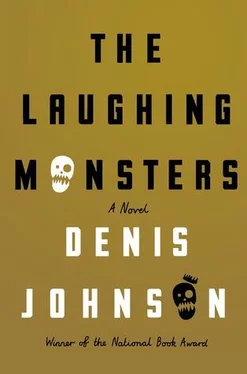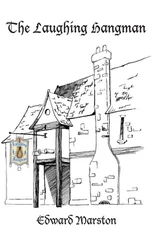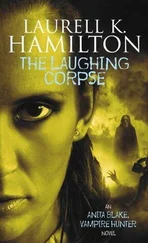As to why I have no computer, it isn’t because they took mine away from me, but because as Michael and Davidia and I headed toward the Congo border in a Land Cruiser borrowed, now stolen, from Pyramid Environments, with our guide or abettor, a Congolese whose name I didn’t catch, Michael stopped the car on a bridge over some tributary of the White Nile River and said, Here we’ll toss our communications, and threw his phone out the window. Davidia chucked hers as well, and I was glad to get rid of everything (although my laptop and second keyboard were guaranteed GPS-untraceable, and my phone was already a replacement. I didn’t want the weight of them anymore, that’s all). It was sunset. Below us people washed their vehicles in muddy water up to the axles, the drivers splashing the red dirt off their rumpled pocked and sagging Subarus and such. Davidia said only one thing: “How long do you have the car for?”—“What?”—“When do you have to return this vehicle?”—“Oh — it’s flexible,” Michael said with a wide smile, as if describing his mouth, “it’s quite flexible.”
My friend and your friend Michael Adriko, that is, and his fiancée, Davidia St. Claire. You knew I went to Freetown on a hunt for Michael. I found him all right, with Davidia on his arm, and I’ll catch you up on all the rest as time allows. To put it in shorthand, Michael’s enthusiasms, let us say, had us leaving Uganda in a rush for DR Congo on Oct 13, just a couple of days ago. We’d jumped from Freetown to northwestern Uganda, a town called Arua, where I last heard from you by e-mail and where I last saw your breasts, and I wish I’d downloaded them … Earlier, at Kuluva Hospital in Arua, while getting his flesh stitched together after a fight it’s pointless to explain, Michael had enlisted a guide to show us a hole in the border, because none of us had Congo papers. When Davidia and I got to the hospital, Michael introduced this man, a skinny little guy in bright blue trousers and a T-shirt that said, I Did WHAT Last Night? and told me to give him one hundred dollars. — When he’s got us through to Congo, I said. — Fair enough, Michael said.
Daylight was almost gone as we got near the border, a good circumstance for people smuggling themselves, and we passed among groves of tall eucalyptus, Michael driving like an African, far too fast for the crumbling red-dirt surface, I mean fast, 90 or 95 KPH mostly, scaring the bikes to the side by means of constant beeping, using the horn much more than the brakes, oblivious to the children, goats, ducks, trucks coming at us, the overloaded busses appearing around road bends, leaning on two wheels, and women walking down the road balancing burdens on their heads, mostly basins full of “white ants”—centimeter-long termites they sell in the market as snacks. I’ve never tried them, but it’s a comfort to realize that every couple hundred meters or so across this land, a chest-high berm teems with nutrient morsels. One of these women crossed our path, her right hand raised to steady the pan on her head, blocking half her sight, she couldn’t have seen us, she kept walking into the road, Michael tried to veer, and we hit her, we struck her down , I heard her say “uh!” in a way I’ve never heard it said, never, and the jeep swerved, bounced, straightened, and kept on … I looked back, she was flung down on the clay pavement in the dusk, she looked lifeless. Davidia said, “Michael! Michael! She’s hurt!”—“She wasn’t watching!” he said angrily, going faster now. His shoulders hunched as he pushed the accelerator hard, and we were racing away from — what? A murder, perhaps. We’d never know. “Michael, Michael,” Davidia said, but Michael said nothing, and she said, “Go back, go back, go back, go back,” but we wouldn’t go back, we couldn’t — not in Africa, this hard, hard land where nobody could help that poor woman flopped probably dead in the road and where running away from this was not a mistake. The mistake was looking back at her in the first place.
No words among us now, just Davidia’s sobbing, and then her silence. Michael drove a bit more soberly as we skirted the border, heading north. If we didn’t find our hole soon we’d come to South Sudan. The surface got terrible. I’m not sure it was still a road. We came into a village, and the guide muttered in Michael’s ear, and we went quite slowly now. Michael switched off the headlamps — he was only using the parking lights anyway—“Let’s enjoy the moon!” It was just past half-full, with that lopsided swollen face, that smile at the corner of its mouth. People strolled around under its strange orange glow. Kids played tag as if it were daytime. We went slower than the pedestrians through this crowded twilight, this thickly human evening. Sudden laughter from a hut, like a soprano chorus. What have they got to laugh about? Bikes without headlights floating out of the dimness. A man leans against a shack, cupping the tiny light of a cell phone to his ear.
The guide said, “Stop.” He got out, shut the door, walked around to Michael’s window and spoke low.
Michael told me, “Give him fifty.”
“Not till we’re in Congo.”
“We’re here. This is Congo.”
“I thought you said one hundred.”
“He’s quitting early. Just fifty.”
I handed Michael a bill. The man folded it up small, then turned away and walked toward a hut, crying softly, “Hallooo.”
“Who’s coming up front — Nair?” Michael asked.
“I guess I am,” I said more or less to Davidia. Her face was invisible. For the last two hours she’d said not a word. We left the village behind and lurched along a half kilometer farther and stopped.
Michael said, “The main road’s over that way, but we’ll never find it till we have some daylight.” He fiddled with his watch. “Set your time backward one hour. We’ve crossed into another zone.”
We sat in the car saying nothing, thinking and feeling nothing, or trying not to, while the weather changed and the stars disappeared. The moon burned right through the overcast with a curious effect, seeming to hang just a few meters above us while the clouds lay behind it, much higher in the sky. Michael switched off the engine. We heard a multitude of insects ringing all around us like finger cymbals. The ringing stopped. Raindrops exploded on the roof and streaked down the dirty windshield.
Stupid, stupid Michael said, “Congo! Here, we’re not in any trouble.”
[OCT 16 2AM]
How much time do I have to catch you up? They won’t move us tonight, surely. The party’s over and everybody’s snoring, sleeping on top of their rifles. The only one awake with me is a radio somewhere — a DJ talking French full-speed and spinning American country music. And two or three mosquitoes making their rounds. Very few mosquitoes at these East African altitudes, though when Michael and Davidia and I came aground in the dark just inside the Congo border, he, Michael — to pick up the journey again — said, “Many voices on the air tonight,” and rolled up the windows against the insects, because as a child he suffered malaria and a mosquito is the only thing on earth, I believe, that scares him.
The car was stifling. I slept, or only suffocated — I saw the woman in the road in more detail, the wrap that covered all but her arms and shoulders in a pattern red or purple, in the dusk it could have been either, and her basin of ants rolling on its edge away from her like a toy, and she lay there as limp as her towel — the white cloth, that is, she’d rolled into a bun to cushion her head — stretched out straight beside her.
Sometime in the night came Michael’s voice: “I’m moving.”
We were both awake I’m sure, Davidia and I.
Читать дальше












